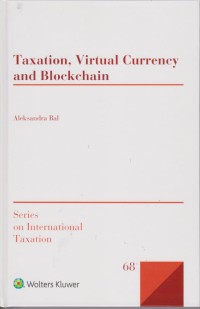
Book
Taxation, Virtual Currency and Blockchain Vol.68
Taxation, Virtual Currency and Blockchain provides an in-depth and comprehensive analysis of tax implications that result from activities such as exchange of goods and services for virtual currency, exchange of legal currency for virtual currency, exchange of virtual currency for another virtual currency, currency mining and possession of virtual currency that appreciates in value. The emergence of convertible decentralized virtual currency schemes confronts tax authorities with unprecedented questions. Among them are the status of virtual currency for tax purposes, which virtual transactions may benefit from a VAT exemption and determining the most optimal method of tax regulation. This book is about traditional tax definitions which are embedded in the law and their ability (or inability) to encompass income generated by new types of economic activity in a manner that maintains both their theoretical justification and their practical implementation.
What's in this book:
Seeking to ascertain whether virtual currency requires additional regulation or whether the law as it stands is adequate to administer its usage, the analysis not only thoroughly explains the nature of the underlying blockchain technology and its regulatory and judicial treatment so far but also identifies best practices for virtual currency transactions and makes recommendations for the improvement of the existing tax systems. Among the aspects of the phenomenon covered are the following:
• Particular aspects of virtual currency use such as smart contracts and initial coin offerings;
• Comparative review of income tax consequences of virtual currency transactions in germany, the netherlands, the united kingdom and the united states;
• Vat/sales tax treatment of transactions involving virtual currency in the european union and the united states;
• Methodology for creating an effective regulatory framework for the taxation of virtual currency; and
• The future of blockchain.
The book has three parts and an annex that describes tax regulations, administrative rulings and court decisions concerning virtual currency in twenty countries. The book examines tax consequences of using convertible decentralised virtual currency schemes (such as Bitcoin or Ethereum) since such currency represents the vast majority of all virtual currency types.
How this will help you:
In its detailed overview of recent tax developments that affect virtual currency transactions and evaluation of tax policies related to virtual currencies, this book has no peers. Especially in view of the Organisation for Economic Co-operation and Development's (OECD) examination of the tax challenges presented by the digital economy as part of its base erosion and profit shifting (BEPS) project, this clear and comprehensive explanation of the functioning of virtual currency and blockchain technology will be welcomed by tax administration officials and by persons mining and transacting in virtual currencies needing to know their tax compliance obligations.
Detail Information
| Call Number |
37 TAX ale
|
|---|---|
| Publisher | Wolters kluwer : United kingdom., 2019 |
| Collation |
xiii, 291 p; 24,7 cm
|
| Language |
English
|
| Classification |
37 TAX ale
|
| ISBN/ISSN |
978-9403501031
|
| Edition |
-
|
| Subject(s) |






